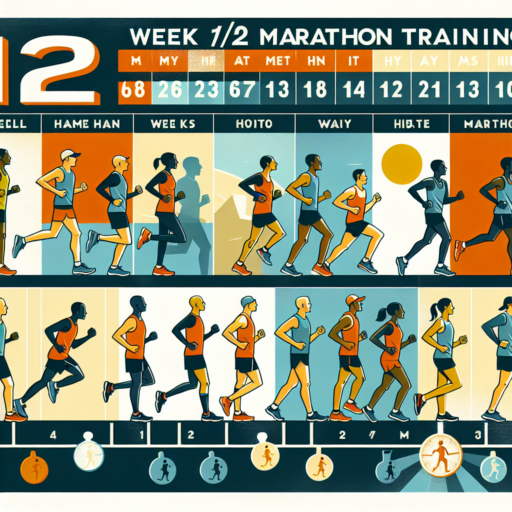Introduction to the 17-Week Marathon Training Plan
Welcome to your comprehensive guide on embarking upon a 17-Week Marathon Training Plan. Whether you’re a seasoned runner aiming to set a new personal record or a beginner with the dream of crossing off a marathon from your bucket list, this plan is structured to help you achieve your goals. Marathon training is no small feat, but with the right plan in place, reaching the finish line is entirely within your grasp.
Over the next 17 weeks, you’ll be gradually increasing your mileage, building endurance, and incorporating various training methods to enhance your running performance. This plan is designed not only to increase your physical stamina but also to mentally prepare you for the 26.2 miles on race day. Understanding the commitment and dedication required for this training is crucial as it’s both time-intensive and physically demanding.
Your journey starts with building a solid base, progressing to more intense and longer runs, and finally tapering in the weeks before the race. Along the way, rest days and recovery weeks are strategically placed to allow your body to adapt and prevent injury.
The Basics of Marathon Training: What You Need to Know
Embarking on marathon training is a journey that requires dedication, perseverance, and a solid understanding of the basics. Whether you’re a beginner eager to cross your first finish line or an experienced runner looking to improve your time, knowing the fundamental aspects of marathon training is crucial. This includes developing a structured training plan, focusing on nutrition and hydration, and understanding the importance of recovery.
Developing a Structured Training Plan
Creating a structured training plan is the first step toward marathon success. This plan should gradually increase your mileage, allowing your body to adapt to the demands of long-distance running. Incorporating rest days and cross-training activities is essential to prevent injuries and improve overall fitness. Remember, consistency is key in building endurance and stamina needed for a marathon.
Nutrition and Hydration Strategies
Effective nutrition and hydration strategies are just as crucial as your running regimen. Fueling your body with the right balance of carbohydrates, proteins, and fats is vital for energy and recovery. Additionally, staying well-hydrated before, during, and after your runs is essential to maintain performance and prevent dehydration-related issues. Tailoring your nutrition and hydration plan to your individual needs can significantly affect your training and race day performance.
Understanding the Importance of Recovery
Lastly, acknowledging the role of recovery in your marathon training can not be overstated. Adequate sleep, rest days, and active recovery techniques such as stretching or foam rolling help your muscles repair and rebuild stronger. Ignoring the signs of overtraining can lead to injuries and setbacks, so listen to your body and give it the rest it needs.
Week-by-Week Breakdown: Your 17-Week Training Schedule Explained
Embarking on a 17-week training schedule is a significant commitment, one that can transform your physical, mental, and emotional state. This program is designed meticulously to progress from foundational conditioning to peak performance, ensuring you hit your fitness goals with precision. Whether you’re targeting a marathon, a fitness competition, or simply aiming to elevate your overall health, understanding the week-by-week breakdown is crucial for success.
Initial Weeks: Building a Strong Foundation
The journey commences with the initial weeks dedicated to building a strong physical foundation. This phase focuses on developing core strength, stability, and endurance. It’s tailored to ease your body into a regular training routine, minimizing the risk of injury, and preparing you for the more intense workouts that lie ahead. Importantly, these weeks are about creating consistent training habits and setting the stage for incremental progress.
Mid-Phase: Intensifying and Specializing
As you transition into the mid-phase of your 17-week schedule, the program intensifies. You’ll encounter workouts designed to push your limits, encompassing a mix of high-intensity interval training (HIIT), strength training, and technique refinement. This is also the stage where specialization becomes key; depending on your specific goals, the training will adapt to focus on areas most crucial for your success. This personalized approach ensures that you’re not just building endurance and strength but also honing the specific skills necessary for your fitness objectives.
Nutrition and Diet Tips for Marathon Training
As you prepare for a marathon, understanding the impact of nutrition on your training and performance is crucial. Amidst the long runs and intense sessions, what you eat plays a pivotal role in how effectively you recover and improve. Below, find essential nutrition and diet tips that can help fuel your marathon training journey.
Optimize Your Carbohydrate Intake
Carbohydrates are your body’s primary energy source during high-intensity activities like marathon training. It’s essential to consume an adequate amount of carbohydrates to replenish your glycogen stores, the energy reserves in your muscles. Focus on complex carbohydrates found in whole grains, fruits, and vegetables, as they provide a sustained energy release. Incorporating a carbohydrate-rich meal or snack before and after your training can significantly enhance performance and recovery.
Stay Hydrated
Hydration plays an integral role in your training regimen. Dehydration can lead to decreased performance, fatigue, and increased risk of injury. It’s important to drink water throughout the day, not just during your runs. An easy way to monitor your hydration level is by checking the color of your urine; aim for a pale, straw-like color. Consider adding electrolyte-enhanced beverages after long runs to replenish lost salts and minerals.
Don’t Neglect Protein
Protein is vital for muscle repair and recovery. After rigorous marathon training sessions, consuming an adequate amount of protein can help repair muscle tissues that break down during exercise. Incorporate a variety of protein sources, such as lean meats, fish, dairy, beans, and legumes, to support muscle recovery. A balanced diet that includes a good mix of carbohydrates, proteins, and healthy fats will keep your body well-fueled for the challenges of marathon training.
Mental Preparation Strategies for Your Marathon Journey
Running a marathon is as much a psychological challenge as it is a physical one. Preparing your mind for the 26.2 miles is crucial for not just reaching the finish line but also enjoying the journey. The following strategies will guide you through setting the right mindset.
Visualize Success
Visualization is a powerful tool for marathon preparation. Imagine yourself crossing the finish line, feeling strong and accomplished. Regularly visualizing your success can build mental resilience and boost your confidence. Dedicate a few minutes each day to this practice, focusing on the positive feelings associated with achieving your marathon goals.
Set Realistic Goals
While aiming for the stars is admirable, setting attainable goals is essential for marathon success. Break down your marathon journey into smaller, manageable objectives. Whether it’s improving your time, running a certain distance without stopping, or simply finishing the race, acknowledging these milestones will keep you motivated and mentally focused.
Essential Gear and Accessories for Marathon Training
When embarking on the journey of marathon training, equipping yourself with the right gear and accessories is crucial for both your performance and comfort. Marathon training demands perseverance, and having the proper equipment can make a significant difference in your training regimen. From the shoes on your feet to the hydration methods you choose, every piece of gear plays an essential role in helping you cross the finish line.
Choosing the Right Running Shoes
Arguably, the most critical piece of gear for any marathoner is a pair of high-quality running shoes. Shoes designed specifically for long-distance running can provide the necessary support, cushioning, and durability needed to handle the miles ahead. It’s not just about the brand but finding the right fit and support for your individual foot type. Investing in a good pair of running shoes can also help prevent common running injuries related to improper footwear.
Investing in Technical Running Apparel
Besides shoes, the clothing you wear during your marathon training plays a vital role in your overall experience. Technical fabrics designed to wick sweat away from your body are essential for keeping you dry and comfortable during long runs. Look for shorts, shirts, and socks made from materials that prevent chafing and provide adequate ventilation. Remember, the goal is to find lightweight and breathable gear that will not hinder your motion or performance.
Hydration and Nutrition Gear
Lastly, maintaining hydration and adequate nutrition during your runs cannot be understated. For those long-distance runs, consider carrying a hydration pack or belt that allows easy access to water or electrolyte drinks without slowing you down. Additionally, portable nutrition solutions such as energy gels or chews can be a handy way to keep your energy levels up without having to stop. This gear might seem minimal, but it’s vital for maintaining stamina and preventing fatigue.
Recovery Techniques to Implement During Your 17 Weeks of Training
Embarking on a 17-week training regimen requires not just determination but also a strategic approach to recovery. Integrating effective recovery techniques into your routine is vital for preventing injuries, reducing muscle soreness, and enhancing overall performance. Achieving the fine balance between pushing your limits and allowing your body to recover can significantly impact your training outcomes.
Active Recovery
Among the most beneficial strategies during your training period is active recovery. This technique involves engaging in low-intensity exercises on your rest days, such as light jogging, swimming, or cycling. These activities boost circulation, facilitating nutrient delivery and waste removal from your muscles, thus speeding up the recovery process without placing additional strain on your body.
Nutritional Support
Another cornerstone of effective recovery lies in your diet. Consuming a balanced mix of proteins, carbohydrates, and fats is essential for repairing and building muscle tissue. Incorporating anti-inflammatory foods like berries, fatty fish, and leafy greens can help minimize muscle soreness, enabling you to return to your training sessions with renewed vigor. Remember, hydration plays a pivotal role in recovery, so maintaining adequate fluid intake is crucial.
Throughout your 17 weeks of training, incorporating a variety of recovery techniques, including both active recovery and optimal nutritional support, can make a substantial difference in your ability to perform and improve. Listening to your body and adjusting your recovery methods accordingly will help ensure that you make the most out of your training efforts, preparing you for peak performance when it matters most.
Common Mistakes to Avoid in Your Marathon Training Plan
Training for a marathon is a monumental task that requires careful planning, dedication, and a strategic approach. As you embark on this journey, it’s crucial to be aware of and steer clear of common pitfalls that can derail your progress. By understanding these key mistakes, you can enhance your performance, ensure a more enjoyable training experience, and significantly improve your chances of success on race day.
Not Prioritizing Rest and Recovery
One significant mistake many runners make is underestimating the importance of rest and recovery. Incorporating adequate rest days and understanding the necessity of sleep cannot be overstated. Rest days are essential as they allow your body to repair itself, adapt to the stresses of training, and prevent burnout. Neglecting recovery can lead to overtraining syndrome, injuries, and a decline in performance, making it a critical aspect of any marathon training plan.
Ignoring Nutrition and Hydration
Nutrition and hydration play pivotal roles in your training regimen. A common oversight is not tailoring your diet to support the increased energy demands of marathon training. It’s not just about consuming more calories; it’s about consuming the right calories from a balanced mix of carbohydrates, proteins, and fats. Equally, maintaining optimal hydration is crucial, especially during long runs. Failing to do so can impair your performance and recovery, and increase your risk of injury and fatigue.
Overlooking the Importance of a Balanced Training Plan
A balanced training plan that includes a mix of long runs, speed work, cross-training, and strength exercises is vital. Frequently, runners focus excessively on clocking up miles, neglecting speed work or strength training. This unidimensional approach not only increases the risk of injury by overloading certain muscle groups but also limits overall performance improvements. A well-rounded plan fosters a stronger, more resilient runner capable of handling the demands of a marathon.
Adjusting Your 17-Week Marathon Training Plan for Success
Embarking on a 17-week marathon training plan is a significant commitment that requires dedication, patience, and, most importantly, the willingness to adjust as you go. Whether you’re a seasoned runner or a newbie, understanding that not every plan fits perfectly out of the box is crucial. Adjustments are often necessary to align with your individual needs, capabilities, and unforeseen challenges.
Listening to Your Body is paramount when following any training schedule. It’s the most accurate tool you have in determining when adjustments are needed. Increasing intensity too quickly or sticking rigidly to a plan without considering fatigue, soreness, or even potential injuries can derail your progress. Recognizing these signs and being flexible in your approach can make all the difference in reaching the finish line in optimal condition.
Another essential element in adjusting your marathon training plan is incorporating Variety in Your Training. Incorporating different types of workouts, such as interval training, long slow runs, and recovery runs, can enhance your performance by improving endurance, speed, and recovery. Moreover, cross-training activities like cycling, swimming, or yoga can prevent overuse injuries by giving your running muscles a much-needed break, while still contributing to your overall fitness and race-preparation.
Frequently Asked Questions About Marathon Training
Training for a marathon poses many questions, especially for those who are new to the long-distance running scene. Whether you’re curious about the right way to train, how to avoid injuries, or the nutrition that best supports endurance running, this section aims to address the most common queries aspiring marathoners have.
How Often Should I Train Each Week?
Most training programs recommend running four to five times a week. This schedule allows for a balance between hard training days and recovery times. It’s essential to listen to your body and adjust your regime as needed to prevent overtraining and injuries.
What Types of Runs Should Be Included in My Training?
Your marathon training should be a mix of long runs, speed work, and recovery runs. Long runs help build endurance, speed work improves your pace, and recovery runs aid in muscle repair. Incorporating variety into your training plan not only makes your sessions more engaging but also equips your body to better handle the demands of a full marathon.
How Important is Nutrition and Hydration?
Proper nutrition and staying hydrated are crucial components of successful marathon training. A balanced diet rich in carbohydrates, proteins, and healthy fats provides the energy necessary for endurance training, while adequate hydration helps maintain performance and prevent injuries. It’s vital to practice your nutrition and hydration strategy during training to avoid any issues on race day.










